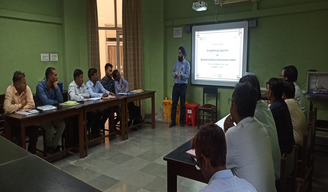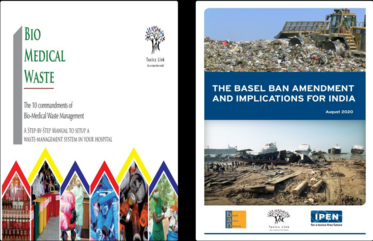INTERVENTION
Toxics Link has been engaged in dealing with the issue of biomedical waste management for over a decade. Disseminating information on segregation of waste in healthcare institutions was the first step in this direction, as only 15–20 per cent of the waste generated in hospitals is infectious/hazardous in nature. About 80–85 per cent of the waste is similar to those found in offices or housing complexes such as paper, cardboard, metal and food. By segregating waste at the source of its generation and thereby preventing contamination, hospital waste can be a potent resource for other uses.
Toxics Link engages with issues of BMW dominantly on 4 levels – Research and Advocacy, Management Systems Modeling, Central, State and Regional Intervention and Awareness Generation, Capacity Building and stakeholder engagement.
BMWM assessment in Delhi (Spreading infections?)
Health care establishment generate bio-medical waste in the process of providing medical services. The generated BMW can be hazardous if not managed properly. Toxics Link, in order to highlight the current practices and to identify the gaps in compliance to Bio-Medical Waste Management Rules, 2016 undertook an assessment study. The specific objectives of the assessment include 1) to map the bedded healthcare facilities in Delhi 2) document the current practices in selected hospitals in terms of Segregation, Transportation, Disposal etc. of BMW 3) to evaluate the Knowledge, Attitude and Practices (KAP) followed in the HCFs of Delhi 4) to investigate if there are any illegal practices by the hospitals prevailed in the state, i.e., dumping of waste or illegal sales etc. 5) to analyze and assess the gaps in the current system and so on.
BMWM assessment in Jharkhand (Failed or Ignored?)
Toxics Link, in association with Lok Swar (Jharkhand), evaluated the current situation of bio medical waste management in compliance with the Bio Medical Waste Management Rules, 2016 in the five cities of Jharkhand, viz. Ranchi, Jamshedpur, Deoghar Bokaro and Dhanbad. It also looks into the availability of infrastructural and management provisions at the healthcare facilities. It has also conducted a workshop to discuss the findings of the study as well as to engage with the stakeholders on measures required to improve the on-ground situation of the bio-medical waste management.
Development of Bio-medical Waste Management Plan in Goa: Toxics Link is working with Goa Waste Management Corporation (GWMC) for developing sustainable strategies to handle the bio-medical waste generated in the state in compliance with the Bio-medical waste Management Rules, 2016. This includes, 1) a situation analysis of the current knowledge, attitude and practices followed in the healthcare sector as well as in the households of Goa, 2) an inventorisation of the generation of bio-medical waste from healthcare facilities and sanitary waste from households in the state, 3) a collection-infrastructure plan for disposal and treatment of bio-medical waste and an awareness plan for the state, 4) training the healthcare professionals in Goa and setting up of waste management system in healthcare facilities and 5) facilitating the construction and operation of Common Bio-medical Waste Treatment Facility in the state.






